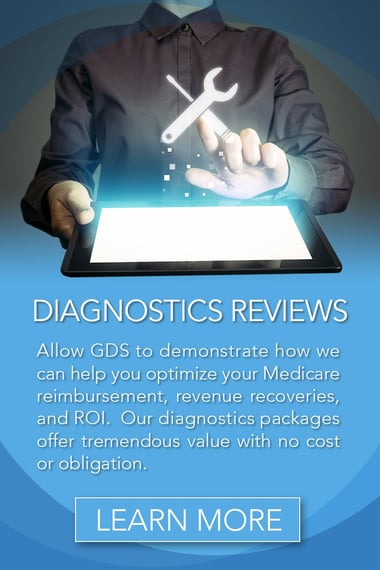MEDICARE DSH
DSHRIP | Medicare Disproportionate Share (DSH) Revenue Improvement Program
MEDICARE BAD DEBT SERVICE
Government Data Services (GDS) will maximize your hospital(s) compliant Medicare Bad Debt (MBD) reimbursement by validating hospital-identified MBD and discovering previously-unidentified MBD using the GDS MBD process as follows:
- Obtain the MBD log for all accounts currently listed for the time period under review.
- Verify that each account on the log should be listed as Medicare Bad Debt.
- Identify questionable Medicare claims that need further research and documentation.
- Use MBD exception reports to show accounts with specific issues needing research, actions taken, and more documentation before accounts can be claimed on MBD logs.
- Identify claims on the initial MBD logs that are incorrect and need to be removed.
- Identify coinsurance and deductible amounts from Medicare claims.
- Cross-reference that information against state Medicaid and Medicare paid claims information.
- Eliminate non-allowable deductible and coinsurance amounts.
- Reconcile Medicare data to the collection agency reports and database.
- Reconcile the remaining amounts against the hospital’s own encounter and transaction data.
GDS provides its unique process to integrate this disparate data and deliver accurate findings in a format that can be easily submitted to the MAC and CMS.
Keep Categories Separate
To reduce the risk of large audit adjustments, through this process we will maintain MBD into three categories:
- Medicare only accounts – Medicare patients with the ability to pay their deductible and coinsurance amounts.
- Medicare/Medicaid crossover accounts – Dual eligible Medicare patients who have Medicaid as secondary insurance and, therefore, no ability to pay their deductible and coinsurance amounts.
- Medicare indigent accounts – Medicare patients who qualify as indigent and, therefore, can pay little or nothing of their deductible and coinsurance amounts.
Process
GDS will use a multi-step process to produce MBD logs that will reduce any major negative reimbursement impact while maximizing the potential reimbursement. GDS will validate hospital-identified MBD and attempt to identify previously-unidentified MBD by reviewing multiple data sets. GDS will produce logs for filing with your Medicare Cost Report including Exhibit 2 logs compliant with Transmittal 18 when it becomes effective:
- Regular Medicare Bad Debt Logs
- Medicare Crossover Bad Debt Logs
- Medicare Indigent Bad Debt Logs
Summary
GDS understands that healthcare providers looking to recover more of their MBD can take steps to ensure reimbursement is made. Reimbursement is particularly important now while it is still available. Critical measures include keeping accurate records, maintaining standard procedures and required elements, and tracking bad debts throughout the year.
By following these recommended steps and utilizing experienced, external professional assistance, healthcare providers may be able to recover significant MBD sums that may otherwise "fall through the cracks."




